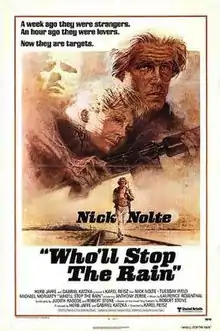| Who'll Stop the Rain | |
|---|---|
 Theatrical release poster by Tom Jung | |
| Directed by | Karel Reisz |
| Screenplay by | Judith Rascoe Robert Stone |
| Based on | Dog Soldiers by Robert Stone |
| Produced by | Herb Jaffe Gabriel Katzka |
| Starring | Nick Nolte Tuesday Weld Michael Moriarty Anthony Zerbe |
| Cinematography | Richard H. Kline |
| Edited by | John Bloom |
| Music by | Laurence Rosenthal |
Production company | Katzka-Jaffe |
| Distributed by | United Artists |
Release date |
|
Running time | 126 minutes |
| Country | United States |
| Language | English |
| Budget | $5.5 million[1] |
Who'll Stop the Rain is a 1978 American crime film[2] directed by Karel Reisz and starring Nick Nolte, Tuesday Weld, Michael Moriarty, and Anthony Zerbe. It was released by United Artists and produced by Herb Jaffe and Gabriel Katzka with Sheldon Schrager and Roger Spottiswoode as executive producers. The screenplay was by Judith Rascoe and Robert Stone, based on Stone's novel Dog Soldiers (1974), the music score by Laurence Rosenthal, and the cinematography by Richard H. Kline. The movie was entered in the 1978 Cannes Film Festival.[3]
Plot
The film opens in Saigon at the height of the Vietnam War.
John Converse, a disillusioned war correspondent, approaches Ray Hicks, a merchant marine sailor and acquaintance of Converse from the U.S., for help in smuggling a large quantity of heroin from Vietnam to San Francisco, where he will exchange the drugs for payment with Converse's wife Marge, who has become addicted to Dilaudid.
When Hicks gets back to the U.S. and discovers he is being followed by thugs connected either to Converse or his suppliers, he goes on the run with Marge and the heroin, and eventually they are pursued by corrupt DEA Agent Antheil, who initially set the deal in motion. As Marge is separated from her supply of Dilaudid, she experiences withdrawal, and Hicks decides to help wean her off her addiction by using the heroin. Hicks also attempts to find another buyer for the heroin before his pursuers can catch up to him.
Cast
- Nick Nolte as Ray Hicks
- Tuesday Weld as Marge Converse
- Michael Moriarty as John Converse
- Anthony Zerbe as Antheil
- Richard Masur as Danskin
- Ray Sharkey as Smitty
- Gail Strickland as Charmian
- Charles Haid as Eddie Peace
- David Opatoshu as Bender
- Joaquín Martínez as Angel (as Joaquin Martinez)
- James Cranna as Gerald
- Timothy Blake as Jody
- Shelby Balik as Janey
- Jean Howell as Edna
- José Carlos Ruiz as Galindez (as Jose Carlos Ruiz)
Background and production
The film is based on Robert Stone's novel Dog Soldiers (1974), which won the National Book Award (US) for fiction in 1975.[4] For its original US theatrical release it was re-titled Who'll Stop the Rain, after the Creedence Clearwater Revival song, which features prominently (along with several other popular CCR tracks) on the film's soundtrack. The film was released as Dog Soldiers in several places. Some copies of the DVD of Who'll Stop the Rain contain prints titled Dog Soldiers.
Stone based the character of Ray Hicks on Beat writer Neal Cassady, with whom Stone became acquainted through novelist Ken Kesey, a graduate school classmate of Stone's at Stanford University.[5]
Hicks' death scene on the railroad tracks at the film's conclusion is directly based on Cassady's death along a railroad track outside of San Miguel de Allende, Mexico, in 1968. The hippie commune setting, where lights and stereo speakers placed throughout the woods are utilized in Hicks' escape plan, is partially based on Kesey's home in La Honda, California, where Kesey and his friends — known as the Merry Pranksters — famously wired the surrounding woods with lights and sound equipment to enhance their experiments with LSD.[6]
The Saigon scenes were filmed on a set in Mexico. There was a casting advertisement in Mexico City for people of any Asian background to represent the Vietnamese.
Awards
- Nominee, Palme d'Or Cannes Film Festival (Karel Reisz)
- Nominee, Best Actor National Society of Film Critics (Nick Nolte)
- Nominee, Best Adapted Drama Writers Guild of America (Judith Rascoe, Robert Stone)
Soundtrack
- Del Reeves - "Philadelphia Fillies"
- Jackie DeShannon - "Put a Little Love in Your Heart"
- Don McLean - "American Pie"
- Slim Whitman - "I'll Step Down"
- Creedence Clearwater Revival - "Hey Tonight"
- Creedence Clearwater Revival - "Who'll Stop the Rain"
- Creedence Clearwater Revival - "Proud Mary"
- The Spencer Davis Group - "Gimme Some Lovin'"
- Hank Snow - "Golden Rocket"
References
- ↑ "AFI|Catalog". Catalog.afi.com. Retrieved 15 November 2021.
- ↑ Silver, Alain; Ward, Elizabeth; eds. (1992). Film Noir: An Encyclopedic Reference to the American Style (3rd ed.). Woodstock, New York: The Overlook Press. ISBN 0-87951-479-5
- ↑ "Festival de Cannes: Who'll Stop the Rain". festival-cannes.com. Retrieved 2009-05-21.
- ↑ "Winners 1970". National Book Award.
- ↑ justforbooks. "Just for Books ...?". Tumblr. Retrieved 2023-11-10.
- ↑ Espen, Hal (June 6, 2004). "America in the Great Stoned Age". The New York Times. Retrieved May 18, 2010. Although technically not a commune, Kesey's home was a frequent site for large parties attended by a mixture of literary luminaries such as poet Allen Ginsberg and journalist Hunter S. Thompson, music figures (including Jerry Garcia, whose group The Grateful Dead later became the house band for Kesey's famous Acid Tests), and outlaws, especially members of the infamous Hells Angels motorcycle club. These parties are described intimately in works by Ginsberg and Thompson, and in Tom Wolfe's book The Electric Kool-Aid Acid Test (1968). Ken Kesey, his Merry Pranksters, and Neal Cassady are also discussed in detail in Martin Torgoff's book Can't Find My Way Home.